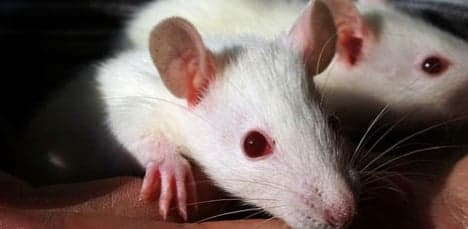European agency rejects GMO rat tumours

The European Union's food safety agency rejected on Wednesday a bombshell French report linking genetically modified corn to cancer saying it failed to meet "acceptable scientific standards."
The European Food Safety Authority (EFSA) said the research by a team led by Gilles-Eric Seralini at France's University of Caen suffered from "serious defects" in design and methodology.
Seralini's team issued a report in September concluding that rats developed tumours after being fed on genetically modified corn developed by US agribusiness giant Monsanto or exposed to one of the company's weedkillers used with the corn strain and containing glyphosate.
But the EFSA said the shortcoming in the team's scientific standards mean "it is not possible to draw valid conclusions about the occurrence of tumours in the rats tested."
The authority, which reviews the use and authorisation of GMOs (Genetically Modified Organisms), added that it "finds there is no need to re-examine its previous safety evaluations of NK603," maize genetically modified by Monsanto.
That same conclusion had been reached in separate and independent assessments of Seralini's work carried out in six European Union nations, the agency added.
The French study's conclusions, illustrated by horrific images of cancer-ridden rats, caused worldwide alarm.
NK603 is resistant to the Monsanto herbicide Roundup, enabling farmers to use the weedkiller just once in the crop's life-cycle and make substantial savings.
Seralini and his team said their experiment in GM food was the first to follow rats through their lifespan, as opposed to just 90 days.
But many experts quickly questioned the experiment's methodology, results and relevance to humans.
The EU agency said its final assessment took into consideration evaluations carried out in Belgium, Denmark, France, Germany, Italy and the Netherlands.
"EFSA noted the emergence of a broad European consensus," it said, stating that the six countries too found Seralini's conclusions "were not supported by the data presented in the study."
It listed weaknesses of the French study as "unclear study objectives, the low number of rats used in each treatment group, a lack of detail on the feed and treatment formulation, key information missing on the statistical methods employed."
In a first response last month, EFSA dubbed Seralini's study "inadequate" and urged him to provide additional information before a second, final review was completed.
But the scientist responded that he would not give EFSA additional information until it first detailed the basis of its own assessment.
"It is absolutely scandalous that (EFSA) keeps secret the information on which they based their evaluation" of NK603 and the pesticide, he said at the time.
"In any event, we will not give them anything," Seralini told AFP.
"We will put the information in the public domain when they do,"
His research group, Criigen, this month issued a list of almost 200 scientists from more than 30 countries who back the GMO study.
Comments
See Also
The European Food Safety Authority (EFSA) said the research by a team led by Gilles-Eric Seralini at France's University of Caen suffered from "serious defects" in design and methodology.
Seralini's team issued a report in September concluding that rats developed tumours after being fed on genetically modified corn developed by US agribusiness giant Monsanto or exposed to one of the company's weedkillers used with the corn strain and containing glyphosate.
But the EFSA said the shortcoming in the team's scientific standards mean "it is not possible to draw valid conclusions about the occurrence of tumours in the rats tested."
The authority, which reviews the use and authorisation of GMOs (Genetically Modified Organisms), added that it "finds there is no need to re-examine its previous safety evaluations of NK603," maize genetically modified by Monsanto.
That same conclusion had been reached in separate and independent assessments of Seralini's work carried out in six European Union nations, the agency added.
The French study's conclusions, illustrated by horrific images of cancer-ridden rats, caused worldwide alarm.
NK603 is resistant to the Monsanto herbicide Roundup, enabling farmers to use the weedkiller just once in the crop's life-cycle and make substantial savings.
Seralini and his team said their experiment in GM food was the first to follow rats through their lifespan, as opposed to just 90 days.
But many experts quickly questioned the experiment's methodology, results and relevance to humans.
The EU agency said its final assessment took into consideration evaluations carried out in Belgium, Denmark, France, Germany, Italy and the Netherlands.
"EFSA noted the emergence of a broad European consensus," it said, stating that the six countries too found Seralini's conclusions "were not supported by the data presented in the study."
It listed weaknesses of the French study as "unclear study objectives, the low number of rats used in each treatment group, a lack of detail on the feed and treatment formulation, key information missing on the statistical methods employed."
In a first response last month, EFSA dubbed Seralini's study "inadequate" and urged him to provide additional information before a second, final review was completed.
But the scientist responded that he would not give EFSA additional information until it first detailed the basis of its own assessment.
"It is absolutely scandalous that (EFSA) keeps secret the information on which they based their evaluation" of NK603 and the pesticide, he said at the time.
"In any event, we will not give them anything," Seralini told AFP.
"We will put the information in the public domain when they do,"
His research group, Criigen, this month issued a list of almost 200 scientists from more than 30 countries who back the GMO study.
Join the conversation in our comments section below. Share your own views and experience and if you have a question or suggestion for our journalists then email us at [email protected].
Please keep comments civil, constructive and on topic – and make sure to read our terms of use before getting involved.
Please log in here to leave a comment.